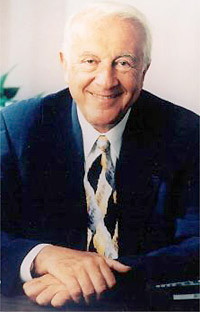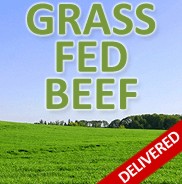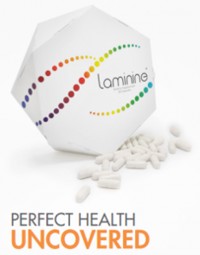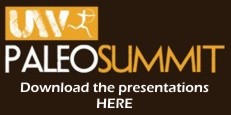If Atkins Was So Wrong, Why Is Paleo So Right?
Ask any unenlightened person that you know, “who was Dr. Atkins?” and you’ll get basically the same response, “I did that diet for a while years ago, it didn’t work for me”, or “Yeah, didn’t he die from a heart attack!?” Without a doubt, the late Dr. Atkins was framed.

Dr. Robert Atkins. Photo Courtesy of wikipedia.org
Here in lies the problem. Imagine that you’re a prominent diet doctor who preaches the wondrous health benefits of your diet to people across the world, telling everyone far and wide that weight loss and good health will ensue from adherence to your diet. What then do you think would be the response of the audience when perhaps your health takes a serious turn for the worse? Add to that the possibility that your health problems were heart related, which enables all of the naysayers to point their accusing fingers at your diet, and we’ve got a real credibility killer on our hands. The last thing any would-be diet guru would want to happen is to fall ill from something that is obviously diet related, or to die from something that their diet is supposed to cure. This is precisely what happened to Dr. Robert C. Atkins on the day that he died, April 17th 2003. Even though his death was caused by multiple factors, which reportedly began after a viral infection 3 years prior, opponents to his beliefs immediately began blaming his diet for his death. This was primarily because he had the misfortune of dying from a heart related condition, which allowed everyone to draw false conclusions as to the cause of his death. The facts about his death, and his infection induced cardiomyopathy, didn’t surface to any degree in the media until after the autopsy, which was obviously long after most people had already lost interest. The verdict was in, Atkins died because of the way he ate, and the practices he preached. In reality, Atkins certainly did not die as a result of his diet, but the damage to his reputation was already done.
Dr. Atkins wrote his original “Diet Revolution” book, all the way back in 1972, which was before the USDA first stepped in to help ruin the nation’s health, but it didn’t manage to gain much notable fame until the mid 1990s. This of course, placed its peak of popularity right at the coincidental peak of the USDA’s induced “fat-phobia”. I remember trying the Atkins diet back in the late 90s, and I remember my experience with it vividly, which was probably because of the ketone-fueled mental clarity that is a known benefit of such a diet. Sure, I lost a few pounds but I didn’t stick with the diet very long. Ultimately, I used the time-honored excuse of giving up because the diet was “too hard to stick to,” as so many others continue to do. Like many others found after quitting the diet, the pounds came back fast, and I got fat.
So was Dr. Atkins wrong? No, in my opinion Atkins was absolutely on the right track. His theories were arguably way before his time, and the timing was not right for him to gain the kind of momentum that would have been necessary to either stop the beginning of a fat-phobic America, or stop it’s progress once it had begun. Atkins was fundamentally right all along.
 Maybe Dr. Atkins’ more advanced age had something to do with a lack of popularity. Today, we have the likes of Robb Wolf, Mat Lalonde, Chris Kresser, and a whole slew of intelligent, young, fit, and athletic looking people who are the current figureheads of the Paleo movement. It’s easy for young, aggressive, health conscious people to pick up the torch and run with the idea of the Paleo lifestyle when they hear Robb Wolf spout such timeless gems as “Science; it just works, bitches!!” like he did during his presentation at the recent Ancestral Health Symposium 2011. Being involved with such an intelligent fringe group is all very alluring, but the main thing that brought me to examine Paleo, was the undeniable mass of readily available hardcore science that backs it all up. Such information was not so accessible to the public in Atkins’ time. The internet wasn’t even around in the 70s when Atkins’ first book was published. Aside from doctors and professors, none of us had access to a miraculous source of information at our fingertips, such as, clinical trial papers, and scholarly reviewed articles, as we do now. I can’t help but think that if the late doctor had begun his quest today in 2011, things may well have been different for him.
Maybe Dr. Atkins’ more advanced age had something to do with a lack of popularity. Today, we have the likes of Robb Wolf, Mat Lalonde, Chris Kresser, and a whole slew of intelligent, young, fit, and athletic looking people who are the current figureheads of the Paleo movement. It’s easy for young, aggressive, health conscious people to pick up the torch and run with the idea of the Paleo lifestyle when they hear Robb Wolf spout such timeless gems as “Science; it just works, bitches!!” like he did during his presentation at the recent Ancestral Health Symposium 2011. Being involved with such an intelligent fringe group is all very alluring, but the main thing that brought me to examine Paleo, was the undeniable mass of readily available hardcore science that backs it all up. Such information was not so accessible to the public in Atkins’ time. The internet wasn’t even around in the 70s when Atkins’ first book was published. Aside from doctors and professors, none of us had access to a miraculous source of information at our fingertips, such as, clinical trial papers, and scholarly reviewed articles, as we do now. I can’t help but think that if the late doctor had begun his quest today in 2011, things may well have been different for him.
The Atkins diet worked, and still does. People have lost hundreds of pound of fat on the program, and the participant’s health improved in all of the now familiar ways. Having said that, the diet lacked one key element that is the driving concept behind the Paleo diet, and that element is “food quality”. Atkins was concerned only with the macronutrients of food consumed on his diet. He stated that weight loss could be maintained simply by limiting the carbohydrate intake to less than 20 grams of “net” carbohydrates each day in the first phase of the program, know as “induction”. There were few assertions made as to what the sources of these foods should be. Of course, grain, starch or sugar based foods were excluded from the list of suggested foods, but there was never any mention of the benefits of only eating real, whole, organic foods. The current Paleo lifestyle, in its most extreme form is known as “Auto-immune Paleo”, because it excludes virtually all foods (aside from eggs) that can and do cause gastrointestinal or auto-immune problems in a large portion of the population. Grains, legumes, and dairy are identified as being particularly troublesome in these areas, so they are strongly prohibited from the diet. In contrast, the Atkins protocol allows for some dairy including cheeses, cream, and butter, but again no specific sources for these foods are defined. Today Atkins Nutritionals produce countless prepackaged meals, meal replacements, and snacks that are all geared towards keeping that important daily “net carb” total low, but no-one seems to care that such foods are no less of a chemistry experiment than many of the other boxed Franken-foods on the market in your local grocery store.
In Paleo today, the recommended source of every morsel of food that we place in our mouths is clearly defined. If a person is going to eat dairy at all, it should be raw and/or pastured dairy. If a person is going to eat bacon, it should be pastured un-cured bacon. We are steered towards locally grown, organic, and non-GMO foods, so that we may simultaneously help support local producers, and have a firm handle on the origin and quality of the food we eat. We are advised to eat predominantly grass-fed, grass-finished beef, because modern science shows us that the important omega-3 fatty acids that our bodies so need, is found more readily in the meat of cows that have been fed only the grass that they evolved to eat. Even the eggs of chickens that have been allowed to freely forage for insects and other foods that are naturally part of a chicken’s diet, are preferred over the kind that are produced by chickens fed mainly grain. The attention to food quality is the aspect that really sets Paleo aside from the Atkins diet. When a Paleo practitioner tells an interested passer-by, “My diet consists of whole, real, organic foods, including pastured meats, and fruits and vegetables from local farmers” who can possibly argue with such a lofty moral and nutritional standpoint? The trend of late is obvious. Most people who started out as basic low-carb, or Atkins proponents, have gradually made the transition to Paleo as the next, natural evolutionary step. At first, no consideration is given to food quality, but as a person becomes more dedicated to the lifestyle, the need for higher quality sustenance becomes apparent. We practice the theories laid out by Dr. Atkins all those years ago, to help us become fat burning machines who look lean and fit like our caveman ancestors, but now with an enhanced focus on ethically treated and produced “quality” foods. We have evolved as a community, and I truly believe that if Dr. Atkins were still with us today, he too would be Paleo and proud.
-
Barry Cripps is a Paleo-based Nutrition and Wellness Consultant, who operates out of Bowling Green, Kentucky. For more information please visit: www.undergroundnutritionist.com
















